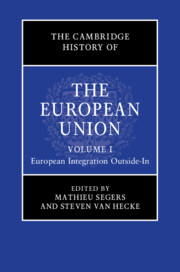Book contents
- The Cambridge History of the European Union
- The Cambridge History of the European Union
- The Cambridge History of the European Union
- Copyright page
- Contents
- Figures
- Contributors to Volume I
- Acknowledgements
- Abbreviations
- Reflections on the History and Historiography of European Integration
- Part I Critical Junctures
- 1 The Emergence of a Divided World and a Divisible West
- 2 European Integration and the Temporary Division of Germany
- 3 Europe, Decolonisation and the Challenge of Developing Countries
- 4 European Integration and Globalisation since the 1970s
- 5 A Europe of Reunification?
- 6 Moderately Failing Forward: The EU in the Years 2004–2019
- Part II Multilateralism and Geopolitics
- Part III Perspectives and Ideas
- Index
- References
5 - A Europe of Reunification?
from Part I - Critical Junctures
Published online by Cambridge University Press: 21 October 2023
- The Cambridge History of the European Union
- The Cambridge History of the European Union
- The Cambridge History of the European Union
- Copyright page
- Contents
- Figures
- Contributors to Volume I
- Acknowledgements
- Abbreviations
- Reflections on the History and Historiography of European Integration
- Part I Critical Junctures
- 1 The Emergence of a Divided World and a Divisible West
- 2 European Integration and the Temporary Division of Germany
- 3 Europe, Decolonisation and the Challenge of Developing Countries
- 4 European Integration and Globalisation since the 1970s
- 5 A Europe of Reunification?
- 6 Moderately Failing Forward: The EU in the Years 2004–2019
- Part II Multilateralism and Geopolitics
- Part III Perspectives and Ideas
- Index
- References
Summary
The beginning of European integration was portrayed as a process of reconciliation among former enemies, Germany and France most prominent among them. Extending cooperation in various functional fields was seen as a step towards eventual unification. Throughout the Cold War, this project was confined to the western part of the continent; the events of 1989, however, changed both the scope and the meaning of integration. After the fall of the Berlin Wall, a broad agreement arose that Europe should be made ‘whole and free’. The eastward enlargement of the European Union (EU) became the main instrument of the continent’s reunification. There was always a clear discrepancy, however, between the political rhetoric of Europe’s reunification and the nitty-gritty of integration. In daily politics, regulatory realignment, expressed in an ever-growing body of laws dealing with disparate issues, dwarfed initiatives in the fields of Europe’s memory, culture and inheritance. While the requirements of institutional integration were clearly spelled out (and imposed on the new candidate states), the question of what a reunified Europe should amount to faded rapidly away.
- Type
- Chapter
- Information
- The Cambridge History of the European Union , pp. 135 - 162Publisher: Cambridge University PressPrint publication year: 2023

